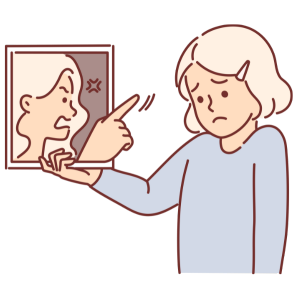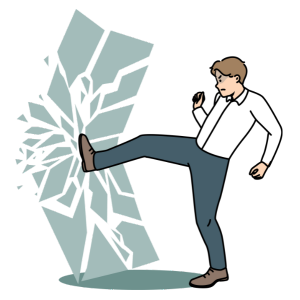Self-reflection is the process of examining one’s thoughts, feelings, and actions. It involves taking a step back and looking inward to understand oneself and one’s motivations better. In the book “Destiny of Choice,” self-reflection is emphasised as a crucial tool for personal growth and success. By regularly engaging in self-reflection, individuals can gain insight into their strengths and weaknesses, identify areas for improvement, and make positive changes in their lives.
Benefits of self-reflection

- Developing Emotional Intelligence and Empathy
Improved self-awareness and understanding of oneself are at the core of personal growth. Individuals can better understand their values, beliefs, and behaviours by reflecting on their thoughts and actions. This increased self-awareness can enhance emotional intelligence and empathy, allowing individuals to understand better and connect with others. The book Destiny of Choice includes multiple instances where Nitin learns to be more empathetic and understand others’ perspectives through self-reflection. - Problem-Solving and Decision Making
Self-reflection also promotes the ability to solve problems and make decisions. By examining one’s thoughts and actions, individuals can identify patterns and behaviours that may be holding them back. They can then take steps to change these behaviours and make better choices. - Self-Acceptance
Additionally, self-reflection can lead to greater self-acceptance and self-compassion, allowing individuals to be more understanding and kind towards themselves. This, in turn, can enhance relationships with others, as individuals are able to be more understanding and empathetic towards those around them. - Goal Achievement
By regularly examining one’s thoughts and actions, individuals can determine if they align with their goals and make necessary adjustments. It also allows individuals to identify and address roadblocks and challenges that may be hindering their progress. Regular self-reflection can help individuals monitor their progress and make necessary course corrections.
In the book “Destiny of Choice”, Nitin regularly engages in self-reflection to achieve his goals and improve his relationships with others. Through self-reflection, he is able to understand and address his flaws, such as his lack of patience, and make positive changes in his life. He is also able to learn from his mistakes and setbacks, developing resilience and determination along the way. - Overcoming setbacks and failures.
By learning from mistakes and failures, individuals can develop resilience and determination. Maintaining a growth mindset, which involves viewing failures as opportunities for learning and growth, can also be beneficial.
From the various events presented in Destiny of CHoice, it is clear that self-reflection also plays a key role in Nitin’s ability to overcome setbacks and failures. When he is unable to rescue Misba from her house arrest, he initially feels defeated. However, through self-reflection, he realises that he has the power to choose his response to the situation. He decides to focus on what he can control rather than dwelling on what he cannot control, which helps him move forward and continue working towards his goal of being with Misba.
Barriers to self-reflection

However, there can be barriers that may make self-reflection difficult. Some examples are time constraints, fear of facing unpleasant truths, and difficulty in setting aside judgments. To overcome these barriers, it can be helpful to start small by setting aside just a few minutes a day for self-reflection. It can also be helpful to practice self-compassion, reminding oneself that everyone has flaws and mistakes.
So, how can one practice self-reflection?
Setting aside dedicated time for self-reflection is crucial. Depending on the individual’s needs, this could be a daily or weekly practice. Asking oneself the right questions is also important. Rather than just reflecting on the surface level, individuals should delve deeper and ask questions about their motivations, values, and behaviours. Different self-reflection techniques, such as journaling or meditation, can also be helpful. Seeking feedback from others, whether through therapy or simply asking trusted friends and family for their perspectives, can provide valuable insight.
Conclusion
In summary, self-reflection is an important tool for personal growth and success. By reflecting on our thoughts and actions, we can better understand ourselves, build emotional intelligence, and make more effective decisions. Although it may be challenging at first, we can overcome any obstacles to self-reflection with effort and honesty. I recommend that young professionals make self-reflection a regular practice in their lives to see the positive impact it can have on their personal and professional lives. To learn more about the importance of self-reflection and how to implement it in your life, I suggest reading the book “Destiny of Choice.”